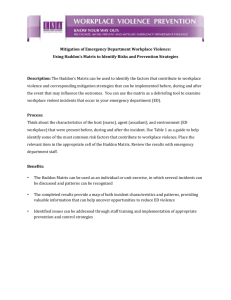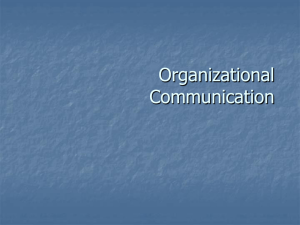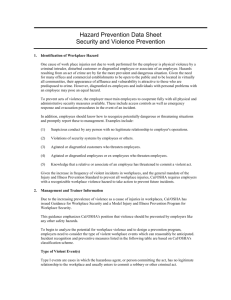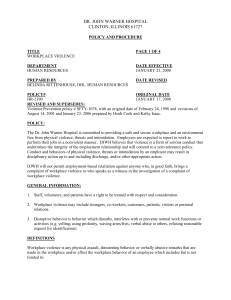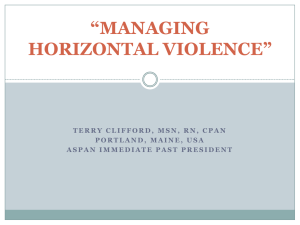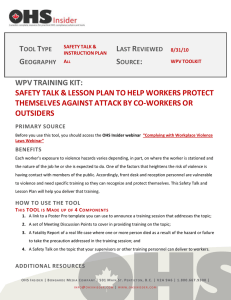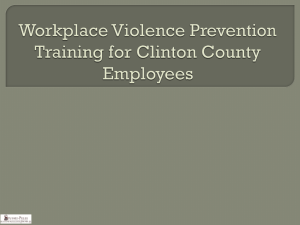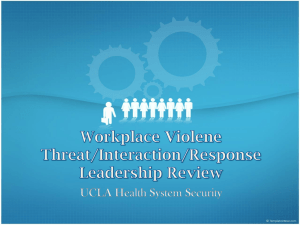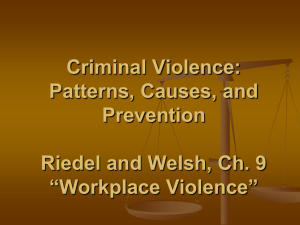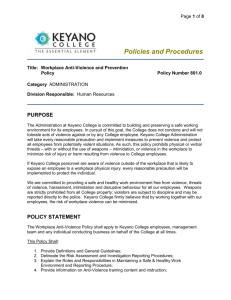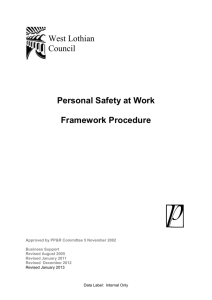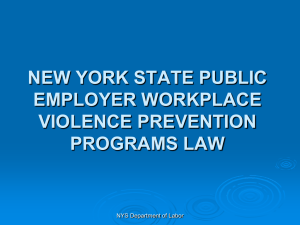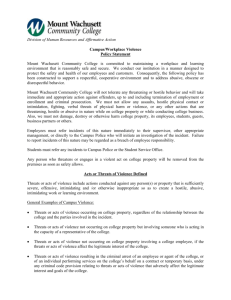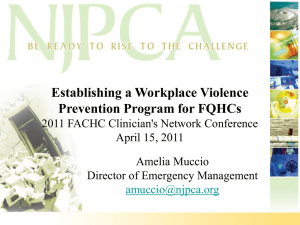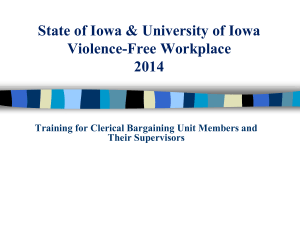Please click here for the presentation
advertisement
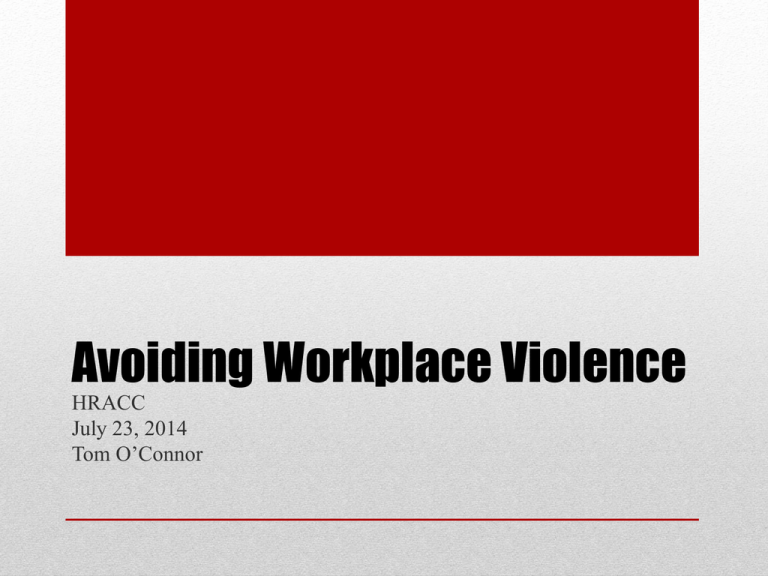
Avoiding Workplace Violence HRACC July 23, 2014 Tom O’Connor • Violent acts, the threat of violent acts, and acts of intimidation against employees or company property and resources. What is Workplace Violence • 2 million incidents of workplace violence annually • Fourth leading cause of all workplace deaths, leading cause of death for women in the workplace. • 506 workplace deaths in 2010 (declining) • Majority of deaths instigated by strangers, 19% in law enforcement, 13% retail, 10% medical operations. • Co-worker violence is about 5% U.S. Department of Labor, OSHA/CDC Scope of the Problem • • • • • • • • Contact with/access to the public Readily available escape routes Exchange of money Mobile workplace (delivery, police, taxi) Contact with unstable or volatile persons Working alone or small numbers Working in high crime areas Selling/holding/guarding high value items Risk Factors for Workplace Homicide Beyond the obvious victim(s): • Impact on company reputation • Impact on productivity • Lower morale/Increased turnover • Diminished job satisfaction • Litigation • Property damage • Injury costs Impacts Early Signals (as much a performance issue as an early warning WPV concern) • New/increased stress at work/home • Memory problems • Deterioration of grooming habits • Greater use of alcohol • Use of prohibited substances • Expressions of anxiety Employee Warning Signs Early Signals (cont.) • Lack of concern for others • Exhibiting unsafe behaviors • Productivity and/or attendance issues • Increasingly taking up supervisors time with behavior or performance issues • Pushing rules to the limit Employee Warning Signs Yellow Flags • Changes in personality or behavior • Irrational beliefs and/or ideas, paranoia • Fascination with weaponry, acts of violence, or fringe groups • Displays of unwarranted anger • Chronically disgruntled • Changes in productivity levels Employee Warning Signs Yellow Flags • Inability to take criticism/externalizing blame/inflexible positions • Verbalizing feelings of being mistreated • Depression • Growing despondency • Specifically talking about causing harm • Conflicts Employee Warning Signs Red Flags • Verbal threats/intimidation • Drastic changes in behavior • Intensifying ongoing conflict • Displays of rage • Displays of contempt for authority Employee Warning Signs Red Flags • Violence toward inanimate objects • Fear reactions among co-workers • Expression of a plan to harm self or others • Sabotage of project or equipment Employee Warning Signs Domestic Violence • No close friends • Obvious physical injuries • Has many “accidents” • Checks with partner constantly • Withdraws from social activity • Wears heavy make-up, dark glasses Employee Warning Signs Domestic Violence • Frequent absenteeism • Frequent tardiness • Increased error rate at job tasks • Depression • Regularly gets flowers/gifts at work Warning Signs • • • • • • • • Change in work status Unfavorable dispute resolution Unrealized promotion Downsizing/consolidation Personal problems Legal problems Financial crisis Health problems Possible Triggers 9-Step Prevention Program Overview After Incident Review Investigation/Intervention Procedures Reporting Procedures Training Risk Assessment Policy Development/Communications Supervisory & Employee Involvement Crisis Team Management Commitment Management Commitment • Communicated commitment by senior management • Use the Golden Rule of Management • Commit needed resources • Provide motivation Prevention Program Overview Crisis Team • Establish procedures for evaluating/ investigating individual cases. • Designate/train individuals to address incidents. • Provide services. • Empower team to act. Prevention Program Overview Crisis Team • Create a cross-disciplinary team. • Review key documents. • Train team in response objectives. • Establish liaisons with outside resources. Prevention Program Overview Supervisory/Employee Involvement • Coordinate efforts • Participate in Crisis Team • Report concerns • Enforce policies Prevention Program Overview Policy Development/Communications • Adopt a zero tolerance policy. • Communicate the policy. • Post policy prominently. • Conduct drug/background screening. • Conduct interviews/exit interviews. • Establish termination procedures. Prevention Program Overview Risk Assessment • Conduct a full review of the workplace safety and security risks. • Conduct periodic inspections. • Identify hazards. • Track and analyze incidents. • Interview employees Prevention Program Overview • Physical barriers • Alarm systems/panic buttons • Natural surveillance • Bright effective lighting • Adequate staffing • Eliminate entrapment areas • • • • • • • • Restrictive “visitor” policy Cash-handling controls Emergency procedures Training CCTV Access controls/ID cards Employee escorts Safe rooms Engineering/Administrative Controls Training • All employees, supervisors, managers • Awareness of potential hazards • Recognition of trouble signs • How to intervene • Schedule periodic training/policy reviews • Document training Prevention Program Overview Reporting Procedures • All incidents no matter how small • Hotline reporting • No reprisals • Confidentiality • Documentation Prevention Program Overview Investigation/Intervention • Investigate all incidents. • Determine all facts. • Decide appropriate intervention. • Follow set procedure for level of incident. Prevention Program Overview After Incident Review • Review program after an incident. • Review/revise with all stakeholders. • Communicate revisions to employees. Prevention Program Overview • Video- City of Houston “Run, Hide, Fight” • http://www.readyhoustontx.gov/videos.html How to Survive a Violent Incident • • • • • • Assist victims, families, and associates. Provide counseling and interventions. Conduct and/or cooperate with investigations. Pay attention to public & business relations. Activate business continuation plans. Identify actions that can be taken (short term, medium term, long term). After a Significant Event • How you manage counts! • It is unrealistic to believe you can make your company workplace violence-proof. • It is also unrealistic to believe you can’t reduce your exposure. Conclusion

